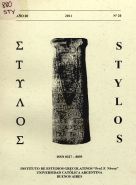Por favor, use este identificador para citar o enlazar este ítem:
https://repositorio.uca.edu.ar/handle/123456789/3964| Título: | La relación entre el bíos theoretikós y el bíos politikós en el pensamiento ético-político de Aristóteles | Autor: | Suñol, Viviana | Palabras clave: | FILOSOFIA GRIEGA; Aristóteles, 384-322 a. C.; BIEN COMUN; CONTEMPLACION; ETICA POLITICA | Fecha de publicación: | 2011 | Editorial: | Universidad Católica Argentina. Facultad de Filosofía y Letras. Instituto de estudios grecolatinos "Prof. F. Nóvoa" | Cita: | Suñol, Viviana. “La relación entre el bíos theoretikós y el bíos politikós en el pensamiento ético-político de Aristóteles” [en línea]. Stylos, 20 (2011). Disponible en: https://repositorio.uca.edu.ar/handle/123456789/3964 | Resumen: | Resumen: Aristóteles heredó de su maestro una concepción intelectualista de la contemplación y ambos procuraron lograr la unión del bíos theoretikós al bíos politikós. Sin embargo, el Estagirita hizo un aporte propio a la cuestión. La separación que propone en EN VI 7 entre la sabiduría (sophía) y la prudencia (phrónesis) no le permite ‘garantizar’ que quien se dedica a la contemplación, v.gr. Anaxágoras y Tales, sea a la vez, un conocedor de lo que es bueno y adecuado en el ámbito práctico. De este modo, se enfrenta al desafío de conjugar la vida práctica y la contemplativa y sobre todo, de lograr que ambas se hagan efectivas en las acciones. El hecho de que el sabio elija actuar conforme a la virtud va más allá de una elección individual, la misma está determinada por el orden político que integra como ciudadano. Aristóteles no se limita simplemente a ‘esperar’ la eventual concordancia de la vida contemplativa y práctica, sino que hace mucho más que ello al diseñar el programa educativo del mejor régimen político y en particular, al reconocerle una importante función cívica al ocio en la búsqueda del bien común (Pol VII y VIII). Abstract: Aristotle inherited from his teacher an intellectualist conception of contemplation and both tried to achieve the union of the bíos theoretikós to the bíos politikós. Nevertheless, he did his own contribution to the question. The separation that he proposes in NE VI 7 between wisdom (sophía) and prudence (phrónesis) does not allow him to ‘guarantee’ that the person who devotes to contemplation, v.gr. Anaxagoras and Thales, can be simultaneously a connoisseur of what is good and appropriate in the practical sphere. Thus, he faces the challenge of bringing together the practical and contemplative life and especially, of achieving that both become effective in the actions. The fact that the wise person chooses to act in conformity with virtue does not depend on an individual choice, it is determined by the political order that integrates as citizen. Aristotle does not limit himself to simply ‘wait’ for the eventual conformity of the contemplative and practical life, but it does much more when he designs the educational program of the best political regime and especially, when he recognizes the important civic function that leisure has in the search of common good (Pol VII - VIII). |
URI: | https://repositorio.uca.edu.ar/handle/123456789/3964 | ISSN: | 0327-8859 | Disciplina: | LITERATURA | Derechos: | Acceso Abierto | Fuente: | Stylos, nº 20, 2011 |
| Aparece en las colecciones: | STY - 2011 nro. 20 |
Ficheros en este ítem:
| Fichero | Descripción | Tamaño | Formato | |
|---|---|---|---|---|
| relacion-bios-theoretikos-politikos.pdf | 169,42 kB | Adobe PDF |  Visualizar/Abrir |
Visualizaciones de página(s)
1.340
comprobado en 30-abr-2024
Descarga(s)
1.541
comprobado en 30-abr-2024
Google ScholarTM
Ver en Google Scholar
Este ítem está sujeto a una Licencia Creative Commons

